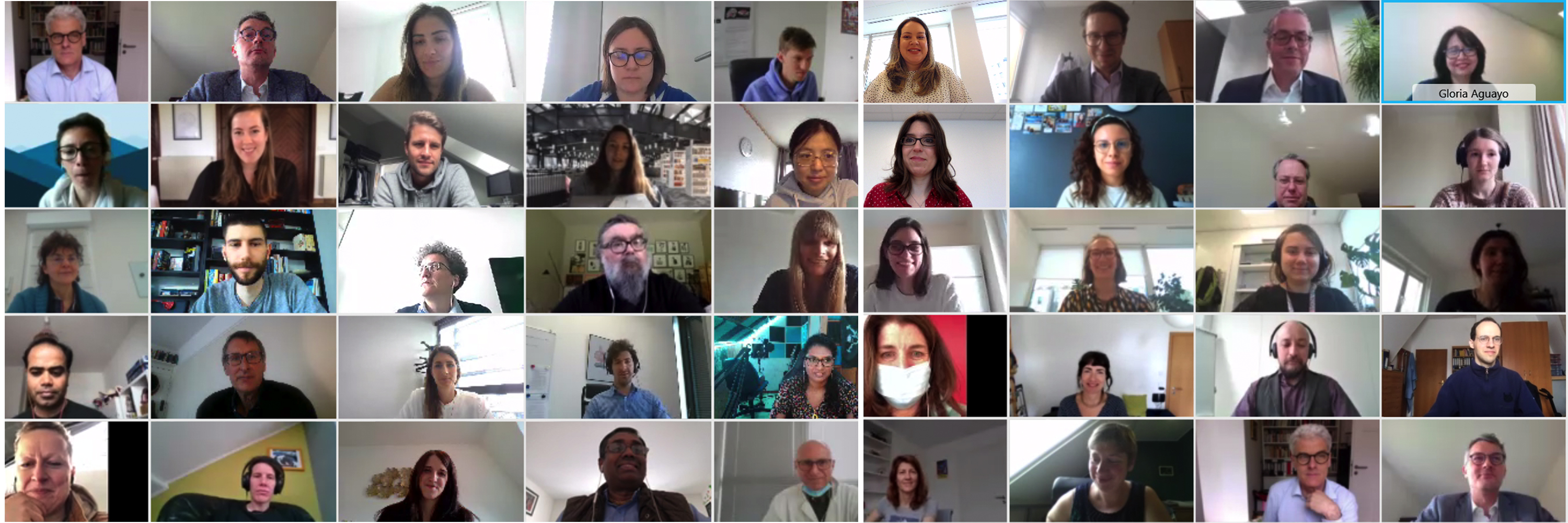
On Thursday, 20 May 2021, the first digital consortium meeting of the National Centre of Excellence in Research on Parkinson’s disease (NCER-PD) took place to discuss about the plans and progress of the research programme. More than 100 national and international partners, including researchers from the University of Luxembourg, the Luxembourg Institute of Health, the Luxembourg Health Directorate, the University of Cambridge, Mount Sinai School of Medicine and Yale University, gave talks on their most recent findings in the field of Parkinson’s disease. The topics ranged from clinical and molecular research results to advanced therapies and translational medicine.
“Despite the pandemic, we have come a long way already to reach our goals of the second NCER-PD phase. Young researchers from Luxembourg presented their results from fundamental and clinical research and this was highly recognised internationally,” said Prof. Rejko Krüger, coordinator of the programme. “By now, NCER-PD is partnering with research institutes and organisations around the world and sharing samples and data with over 14 projects worldwide. These collaborations are crucial in order to improve early diagnosis and treatment of Parkinson’s disease.”
The successful development of NCER-PD
Since its launch six years ago, in April 2015, the consortium of this first national centre of excellence funded by the FNR has come together five times already to discuss the successful implementation and steady progress. The aim of this 8-year programme is to identify new methods for the early diagnosis of Parkinson’s disease and the stratification of patients in subgroups. To achieve this, laboratory tests are combined with computational tools to analyse biological samples and data at the systems level. This means that no gene, protein or pathway will be looked at in isolation but rather as part of a network or of multiple networks.
After the first 4-year phase, the Luxembourg Parkinson’s Study reached its ambitious goal of 1600 participants - 800 patients and 800 controls - recruited in Luxembourg and the Greater Region. In December 2019, the project entered its second phase continuing on follow-up examinations of existing participants (yearly for patients and every four years for controls) and still inviting new inclusion of recently diagnosed patients.
Recently, two new cohorts were launched: the Luxembourg National Sleep Survey and the GBA-MRI Study.
The Luxembourg National Sleep Survey targets Luxembourg residents aged 55 to 75 years old, with the aims of:
- better understanding the role of REM sleep behaviour disorders (RBD) in the early phases of neurodegenerative diseases, such as Parkinson’s disease.
- determining for the first time how many people in Luxembourg are affected by this sleep disorder.
- gaining insight into strategies for preventing neurodegenerative diseases.
“While participation in the online questionnaire is still possible until mid-June, more than 20,000 people have already actively supported our research on RBD,” said Rejko Krüger. “Here, I would like to express my heartfelt thanks for the continuous support of our participants, who enable us to reach our goals and now to also look into the earliest stages of Parkinson’s disease, even before motor symptoms arise.”
The aim of the GBA-MRI Study is to examine the genetic underpinnings of Parkinson's disease. More specifically, to define:
- the consequences of mutations in the so called ‘GBA’ gene, the most common genetic cause of Parkinson’s disease, on the structure and function of the brain.
- how one can differentiate between GBA mutation carriers with a risk of developing Parkinson’s disease and those who do not develop neurological symptoms.
The invitations to participate in this study are based on the systematic genetic profiling of all participants in the Luxembourg Parkinson’s study, according to the written consent for genetic analysis, which includes an examination of the GBA gene. “Thanks to our collaboration with the team of Prof. Bas Bloem from the Radboud Medical Centre in Nijmegen, The Netherlands - to which participants will travel for medical imaging exams together with our clinical research team - we have access to world-leading expertise in brain imaging research,” describes Prof. Rejko Krüger, highlighting the unique setup of this international collaborative study.
At the end of this first digital meeting, the principal investigators of the NCER-PD consortium met with the Scientific Advisory Board, composed of renown Parkinson’s researchers, Roger Barker (University of Cambridge, UK), Warren Olanow (Mount Sinai School of Medicine in New York City, USA) and Gerd Kempermann (Dresden University of Technology, Germany), to discuss and get expert advice on the direction for years to come.




